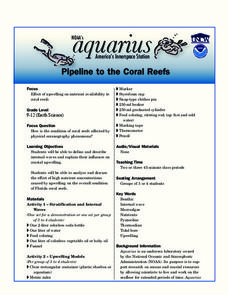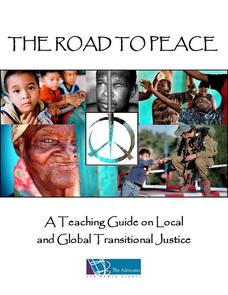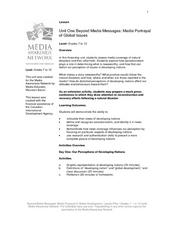US Institute of Peace
Organizations Working for Peace
We're all in this together! Show young scholars that peace is a process and having the support of like-minded people can make it happen. 13th in a series of 15 peace building activities, groups conduct research on a peace organization,...
US Institute of Peace
Organizations Working for Peace
From helping refugees to negotiating peace treaties, the peacekeepers of the world keep busy! Introduce young activists to the many individuals and organizations throughout the world that work daily toward peace. 14th in a series of 15...
Curated OER
Classifying Deep-Sea Organisms
Young scientists access the EARTH Web site in order to engage in this lesson life forms found in the ocean. Student groups of 3 - 4 choose one set of deep-sea organism images. The groups decide how they would classify their organisms and...
EngageNY
Researching about the Red Cross: What Is a Multinational Aid Organization?
Lend a helping hand. Pupils read two informational articles about international aid organizations and how they help areas affected by natural disasters. Scholars attempt to uncover the gist of each text, discussing their thoughts in...
Hood River County School District
Text Structure: Features and Organization
Teach learners how to interact with both fiction and non-fiction text with a packet of activities and worksheets. After looking over text structure and the difference in text features between different types of writing,...
Curated OER
Tunes for Bears to Dance to: Graphic Organizer Strategy
"What are Henry's options?" "What do you think Henry will do?" To better understand the central conflict for the main character in Robert Cormier's Tunes for Bears to Dance to, class members engage in a compare-and-contrast activity that...
EngageNY
Building Background Knowledge: The Internment of Japanese-Americans during WWII, Part 1
It is all in the details. Scholars read The Life of Miné Okubo and pay special attention to details that reveal Okubo's character. Completing their Understanding Miné: Character Traits graphic organizers and recalling the descriptions...
Annenberg Foundation
Global America
It's not really a small world after all! The 21st lesson of a 22-part series on American history researches the impact of globalization on the United States. Using photographic and written references materials, as well as video sources,...
Missouri Department of Elementary
Are You Balanced?
Balance scales create a strong visual of how an individual prioritizes one's self alongside their commitments to the community, school, and home. Scholars complete a graphic organizer then discuss their findings with their peers. A...
Shaker Junior High School Library Media Center
WWII Project Outline
Work together as a class and get to know the ins and outs of World War II with this engaging collaborative project. Class members are broken into groups to research particular war topics, from life on the home front to the Holocaust and...
Council for Economic Education
Satisfaction Please! (Part 3)
Understanding the US government's role proves very important in the American economy, especially for consumers. Scholars learn about how varying government agencies help them when facing an issue. The third and final resource in the...
Florida International University
Pipeline to the Coral Reefs
Discover firsthand the effects of internal waves on coral reefs. Through a series of experiments, learners simulate internal waves and upwelling events as they make observations on the movement of water and other debris. They then...
California Department of Education
Learn to Reach Out
How can social media help my career? Explore the world of networking through a lesson about professional organizations. The fourth of six career and college readiness lessons has seniors research organizations in their professions of...
iCivics
Conflict & Cooperation
Considering such conflicts as the Vietnam War and the war in Afghanistan, what motivates nations to cooperate? Your class members will analyze past and current international events in order to understand the types of conditions and...
Will Stegar Foundation
Citizen Climate
Many of the leading scientists in the world are studying climate change, and your learners can join in the discussion with a unit from the Will Steger Foundation. High schoolers work on eight lessons that focus on different aspect...
Advocates for Human Rights
A Teaching Guide on Local and Global Transitional Justice
The Road to Peace introduces learners to the concept of transitional justice, a process where nations examine the causes of conflict, identify abuses, and use this information to develop a plan to transition to a society that upholds...
Curated OER
Beyond Media Messages: Media Portrayal of Global Issues
Take a close look at news reporting techniques and global issues. Begin by creating a graphic representation of developing nations and defining the term. After class discussion, the second day's activities pick up by deconstructing news...
University of California
Roots of the Cold War
When and how did the Cold War begin? To answer this question, you will not find a better-organized, in-depth, activity- and inquiry-based resource than this! Executing best teaching practices throughout, each portion of this inquiry...
Smithsonian Institution
A Ticket to Philly—In 1769: Thinking about Cities, Then and Now
While cities had only a small fraction of the population in colonial America, they played a significant role in pre-revolutionary years, and this was certainly true for the largest city in the North American colonies: Philadelphia. Your...
Pulitzer Center
Peacebuilding: Taking Home Lessons Learned in Africa
Learners take a closer look at one journalist's work on UN Peacebuilding efforts in four African nations: Sierra Leone, Burundi, Central African Republic, and Guinea Bissau. They collaborate to define peacebuilding and discuss...
American Press Institute
Creating a Classroom Newspaper
Hot off the press: a mini-unit for class members to create their own newspaper. Complete with graphic organizers, extension activities, and helpful learning targets that teach parts of a newspaper, the resource contains everything needed...
Curated OER
Lesson Four: Comparatives and Superlatives
Put on your best smile, or a least a better one, for this lesson plan on superlatives and comparatives. English language learners first fill out a graphic organizer by finding other people in the class who are taller than they are,...
Virginia Department of Education
World History and Geography to 1500 A.D.
Here's a great resource for your curriculum library. The 240-page packet, organized into units by topics, includes sample lesson plans, links to primary and secondary source documents, worksheets, activities, and sample assessments.
Annenberg Foundation
Postwar Tension and Triumph
Go get the American Dream lifestyle! The 19th lesson in a 22-part series exploring American history shows learners the post-WWII economic boom. Using primary sources, photographs, and cartoons, groups discuss their findings and present...

























